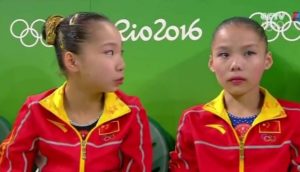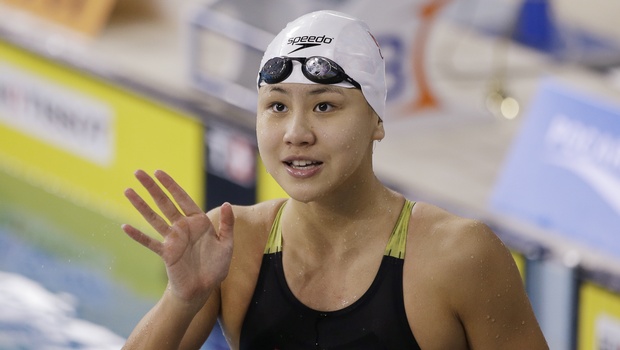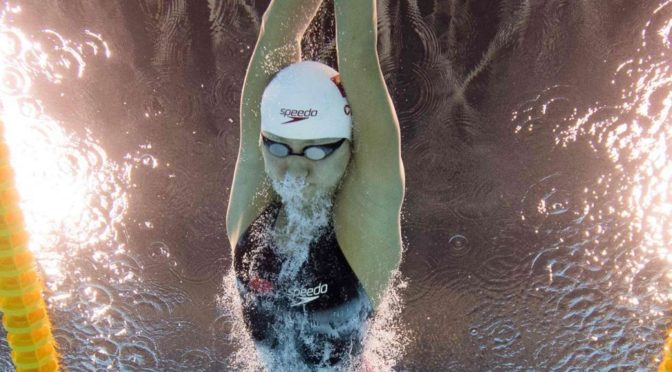China Medal Count
11 gold, 8 silver, 11 bronze
Day 6: Medals
Gold: Ma Long (men’s table tennis)
Silver: Zhang Jike (men’s table tennis); Zhang Binbin (women’s shooting 50m rifle 3 positions); women’s epee team (fencing)
Bronze: Shi Jinglin (women’s 200m breaststroke); Wang Shun (men’s 200m IM); Du Li (women’s shooting 50m rifle 3 positions)
Day 7: Ones to Watch
No ping pong on Day 7 – so no certainties for China – but good chances will come for the men’s 20km race walk trio of Olympic champion Chen Ding, Cai Zelin and Wang Zhen, the men’s foil team, Cao Yifei in the men’s 50m rifle prone event and Gong Lijiao in the women’s shot. Xu Lijia in the laser heads China’s sailing charge, Liu Yaxin and Li Zhuhao go in swimming finals, long jump contender Wang Jianan goes through qualification, while He Wenna and Li Dan are among 16 women in the trampoline event. Li Haotong and Wu Ashun continue in the men’s golf, but two names in the pool will be scrutinized above all others: Sun Yang is due to swim in the 1,500m heats – but may yet withdraw – while Chen Xinyi is currently down to swim in the women’s 50m freestyle, but would need an unlikely ruling from CAS to allow her to compete given her positive doping test (see below).
Day 6: Review
On some days, so much happens at the Olympics, it’s hard to know quite where to look.
Golf returned to the Games for the first time in 112 years – and Justin Rose promptly shot a hole-in-one. In the other new sport, Fiji shocked the big boys to take gold in the men’s rugby sevens. Elsewhere, China had another 1-2 in the men’s table tennis, as Ma Long beat Zhang Jike 4-0, to keep its hopes alive for another clean sweep.

Simone Biles – all four foot nine of her – dominated in the gymnastics, while China’s Shang Chunsong – whose heartbreaking backstory is here – missed out on bronze by 0.116 points and ended in tears. Meanwhile, another American Simone – Manuel – became the first black female gold medalist in the pool in a rarely-seen tie for gold with Penny Oleksiak, who herself became the first athlete born in the 2000s to win an individual Olympic gold medal. And Michael Phelps won yet another gold medal – his 22nd – although the poor commentator on Canadian TV mixed Phelps up with his rival Ryan Lochte for the entire race.
Too many highlights to mention them all, but perhaps the most significant news to emerge on Day 6 of the Games was also the most depressing.

News trickled out towards the end of the day that 18-year-old swimmer Chen Xinyi, who finished fourth in the women’s 100m butterfly final, tested positive for the banned diuretic hydrochlorothiazide earlier in the week and will have her case heard on Friday by the Court of Arbitration for Sport (CAS).
Given the furore already surrounding the swim team, following Australian Mack Horton labeling Sun Yang a “drug cheat” both before and after beating him in the 400m freestyle final, the timing of this latest case couldn’t be worse.
The Chinese Swimming Association appears to have already thrown Chen Xinyi under the bus, saying that they have demanded her full cooperation during the investigation. Chen shot to fame as a 16-year-old, with three gold medals at the 2014 Asian Games, but, given the way that national team training operates in China, the view from afar will almost certainly be that the teenager did not act alone.
No matter how the CAS rules, Chen will inevitably be seen as tainted in the eyes of many international observers, given the long history of doping cases associated with China. In fact, details of that history have been circulating on Chinese social media platforms in recent days, with many reading for the first time about cases that have long been discussed overseas. While Chinese may not appreciate the attacks from the west, including the media, these pieces have at least helped to provide more context on the western perspective, but there will now be another wave of “attacks” in light of the Chen Xinyi case.
John Leonard, the Australian coach who openly questioned Ye Shiwen’s dominant performances in London four years ago, has said he plans to launch a breakaway “Super League” for the top swimmers around the world in response to these controversies, while Bob Bowman, the respected coach of Michael Phelps, has said the twin governing bodies – FINA and the IOC – have repeatedly dropped the ball on the issue of doping.
The system is broken, Bowman said, and has to be fixed.
Meanwhile, athletes are pissed. Hong Kong doesn’t get a whole lot of medals (none so far in Rio), but Stanford grad Geoffrey Cheah took aim at swimmers, including Sun, who had failed drugs tests, after missing out on a podium experience at the 2014 Asian Games: he finished fourth in a freestyle event, but was only upgraded later when Park Tae-hwan was caught doping.
The three Olympic ideals are excellence, friendship and respect, and while there has been plenty of excellence on display in Rio, the other two ideals have often been set aside. Instead of being united by the Games, athletes appear increasingly divided and, the way things are progressing, China will be left on the wrong side of that divide.


